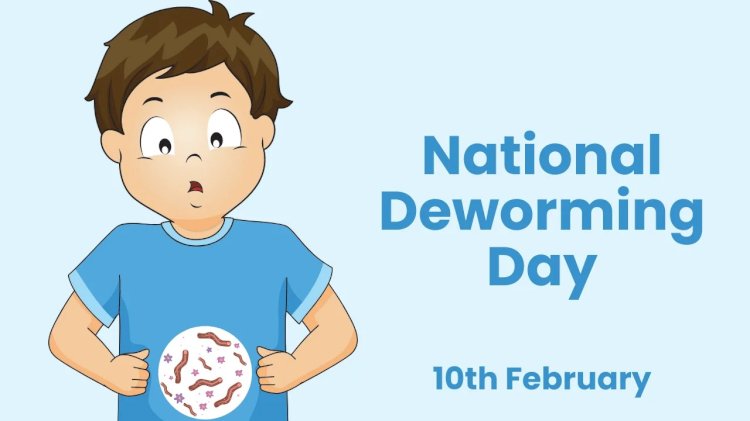World Deworming Day: Combatting Parasitic Infections for a Healthier Future
World Deworming Day, observed annually on February 10th, highlights the critical importance of deworming in combating parasitic infections, particularly among children. Parasitic worms pose significant health risks, including malnutrition and impaired cognitive development, making deworming interventions essential for public health. On this day, global efforts unite to administer deworming treatments, raise awareness, and promote hygiene practices. Sustainable progress requires long-term investments in healthcare infrastructure and education to empower communities to prevent and manage parasitic infections effectively. World Deworming Day serves as a rallying point for collective action, emphasizing the commitment to building a healthier future for all.
By Shreya Rajvanshi Gangal

Every year, on the 10th of February, people around the globe come together to observe World Deworming Day—a day dedicated to raising awareness about the importance of deworming in combating parasitic infections, particularly in children. Organized efforts on this day aim to reach millions of children in need, providing them with vital deworming treatments to safeguard their health and well-being.
Understanding the Significance of Deworming:
Parasitic worms, also known as helminths, are organisms that live in and feed off a host organism, often causing harm and disease. These worms can infect the human body through various means, including contaminated food and water, poor hygiene practices, and inadequate sanitation. Common types of parasitic worms include roundworms, hookworms, whipworms, and tapeworms.
Infestations of these parasites can lead to a range of health issues, including malnutrition, anemia, stunted growth, and impaired cognitive development, particularly in children. The effects of these infections can be devastating, hindering individuals' ability to thrive and reach their full potential.
The Role of Deworming in Public Health:
Deworming, or the administration of medication to eliminate parasitic worms from the body, plays a crucial role in public health efforts, especially in regions where parasitic infections are prevalent. Regular deworming treatments can effectively reduce the burden of parasitic worms, thereby improving overall health outcomes and promoting socio-economic development.
Deworming interventions are particularly impactful in school-age children, as they are more susceptible to parasitic infections due to factors such as poor hygiene practices and close contact in school environments. By targeting this vulnerable population, deworming programs can prevent the spread of infections, reduce absenteeism in schools, and enhance educational outcomes.
The Global Effort on World Deworming Day:
World Deworming Day serves as a rallying point for governments, non-governmental organizations (NGOs), healthcare professionals, and communities worldwide to unite in the fight against parasitic infections. On this day, various activities are organized, including mass deworming campaigns, educational workshops, and advocacy events, to raise awareness and mobilize resources for deworming initiatives.
Key stakeholders work collaboratively to ensure the widespread distribution of deworming medication and promote best practices in hygiene and sanitation. Additionally, efforts are made to address underlying factors contributing to parasitic infections, such as poverty, inadequate access to clean water, and sanitation infrastructure.
Empowering Communities for Sustainable Change:
While World Deworming Day serves as a catalyst for immediate action, sustainable progress in combating parasitic infections requires long-term investments in healthcare infrastructure, education, and poverty alleviation. Empowering communities with the knowledge and resources to prevent and manage parasitic infections is essential for breaking the cycle of transmission and improving health outcomes for generations to come.
Education plays a pivotal role in empowering individuals to make informed choices regarding hygiene, sanitation, and preventive healthcare measures. By fostering a culture of hygiene and promoting behavior change at the grassroots level, communities can reduce the risk of parasitic infections and enhance overall well-being.
Conclusion:
World Deworming Day serves as a poignant reminder of the global challenges posed by parasitic infections and the collective responsibility to address them. By prioritizing deworming efforts and investing in comprehensive public health interventions, we can create a world where all individuals, especially children, have the opportunity to lead healthy and fulfilling lives. As we commemorate this day, let us reaffirm our commitment to combatting parasitic infections and building a healthier future for generations to come.
What's Your Reaction?



















